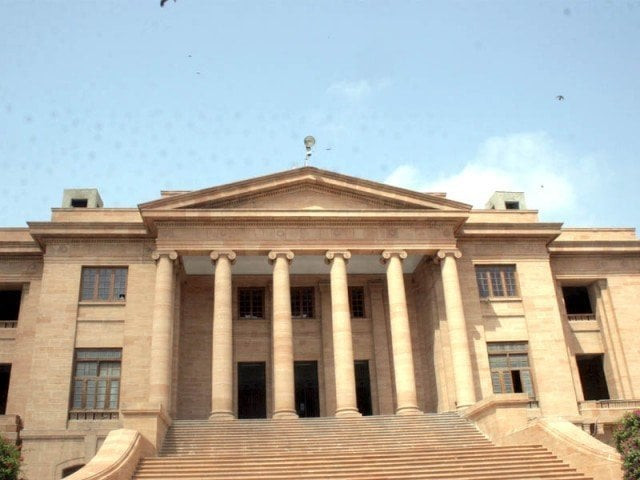LG laws amended amid chaos
Assembly places solid waste management under control of mayors

Amid agenda papers being thrown at the speaker and much pandemonium, the provincial assembly passed the Sindh Local Government Amendment Bill 2021 in a chaotic session on Saturday. Another crucial and related development was the handing over of the Sindh Solid Waste Management to metropolitan/municipal corporation mayors.
Previously, the Sindh Solid Waste Management board had been placed put in the hands of the chief minister and later under the control of the local government minister. With the recent amendments, mayors in all the divisional metropolitan municipal corporations will look after its functions in order to arrange effective delivery of sanitation services. The bill was passed amidst an opposition uproar as MPAs tore copies of the agenda and created pandemonium.
Proceedings started with Sindh Assembly Speaker Agha Siraj Durrani in the chair. “We are passing this law (LG Amendment Bill 2021) after a long deliberation with different stakeholders and consultation of Sindh Governor Imran Ismail. I fail to understand why the opposition is creating a hue and cry in the session,” Sindh Minister for Local Government Nasir Shah said while moving the bill. He added that with the recent amendment to the local government law and solid waste management bill, the provincial government had empowered the local bodies.
According to the law, Sindh solid waste management boards would be established at divisional headquarters including Karachi, Hyderabad, Sukkur, Larkana, Mirpurkhas and Shaheed Benazirabad where the mayor of the concerned metropolitan/municipal corporation will be chairperson. Meanwhile, the commissioner of the area would work as vice-chairman with two other members. “The divisional board may have the authority to include other areas, such as town committees and municipal committees, adjacent to the metropolitan of municipal corporation, under its operational control,” the law states.
Also, a steering committee would be formed under the supervision of the local government minister with commissioners, finance and local government secretaries, mayors and two persons each from the academia and NGOs as members to provide policy guidelines to the boards on various issues. “The Sindh Solid Waste Management law was passed in 2014. Ever since, opposition parties have demanded that the authority be placed under the mayor.
We are doing it now. Opposition members, instead of appreciating us, have created pandemonium in the house,” the LG minister added. Local bodies to monitor police, health Earlier, the Sindh Assembly reversed controversial amendments to the local government law, which was passed with majority votes of the ruling Pakistan Peoples Party (PPP) on November 26. Sindh governor Imran Ismail, instead of giving his consent, expressed serious observation over different clauses of the bill and suggested that the assembly reconsider the legislation.
Speaker Agha Siraj Durrani, reading the Sindh governor’s observations over seven clauses of the bill, asked the Sindh minister for Excise and Parliamentary Affairs Mukesh Kumar Chawala if the government wanted to reconsider its decision over the law. The observations were about the election of mayors, deputy mayors, chairman and vice-chairmen of the councils. “How can the council elect any person as mayor, deputy mayor or chairman and vice-chairman?
Those people, who are elected representatives of local councils, should be given the responsibilities,” the governor observed. Apart from this, the governor expressed his dismay over the “secret ballot” in local bodies’ elections. He believed this could lead to horsetrading. In another observation, the Sindh governor expressed his reservation of moving immovable property tax collection from local bodies to the excise and taxation department.
Chawla, referring to the cabinet decision, said that the provincial government had accepted the governor’s observations and wanted to move the revised bill. He then gave the floor to local government minister Nasir Shah to move the bill in light of the cabinet decision. As Shah stood up to move the bill, the joint opposition protested. “We realise that the law was passed in haste because of the election commission’s pressure to finalise the bill and submit its copy to the chief election commissioner without delay. We, on the directives of our party leader Bilawal Bhutto, have revised the law and are overcoming the opposition and Sindh governor’s objections,” Shah told the house.
“In this law, we have empowered union councils too. Officials of education, health, police, agriculture, livestock, sports and women development departments will submit their quarterly reports to local councils such as town committees, municipal committees and union councils,” he said. The local government minister added that the council will deliberate on reports and send observations to the head of the concern institutions. “The district head of the police will coordinate with the chairman or mayor of the concerned council for the effective functioning of the police.
However, this will not allow interference in the affairs of the police administration,” Shah concluded. Opposition members, while protesting over the issue, tore agenda copies and chanted slogans against the PPP government. MPAs from PPP and PTI came face to face, threatening and pushing each other in the house. Some opposition members went to the speaker’s podium and threw agenda copies on Agha Siraj Durrani who was chairing the session. Speaking on the issue, Sindh Chief Minister Syed Murad Ali Shah called the opposition members “uneducated” as he claimed had no idea about legislation and public interest.
“We have made the law with the consultation of the governor, who belongs to PTI, to fulfill their demands. Still, they are still protesting over it,” he remarked. After the protest and walkout by the opposition, the assembly passed amendments to the Sindh Factories Law, increasing penalties against those that fail to register their business with concerned authorities. Later, the speaker prorogued the session for an indefinite period.



















COMMENTS
Comments are moderated and generally will be posted if they are on-topic and not abusive.
For more information, please see our Comments FAQ